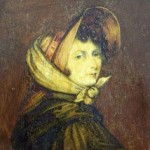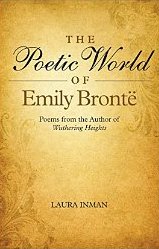I attended an all-boys public high school. Sophomore English was a survey of world literature, “world” defined as British and American. Among a number of other works, we read Shakespeare’s Julius Caesar and Emily Brontë’s Wuthering Heights. We had to pay for the paperback edition ordered by the teacher, so you could identify all sophomores at any given time by seeing what books they carried around and whether Wuthering Heights with a purplish-blackish cover was among them (this was in the days before backpacks).

Class discussions on the book—for a solid week—were painful. More than a few openly rebelled and wouldn’t read it at all. A few were smarter than that and at least bought the Cliff’s Notes version. A few struggled through the actual text. To my knowledge, only one boy in the class liked it, but knew better than to tell anyone. The teacher, however, figured it out when she graded our essays. She made a point of extolling the virtues of this one particular essay and even read selected passages.
I never forgave her.
I did learn about Emily Brontë (1818-1848) from reading the book. Part of our lesson plan was a biographical exercise. I knew she was one of six children whose mother had died young. Two older sisters had died before her, as did her one brother and (eventually) her younger sister. I knew that she and her sisters Anne and Charlotte had published a book of poetry under pen names that sold all of two copies. I knew her sister Charlotte had written Jane Eyre (I read the Classics Illustrated comic book version long before I read the novel). I knew Wuthering Heights was not well received by Victorian critics, and its merits were recognized much later. And I knew that Emily died of tuberculosis when she was 30.

That Inman uses Wuthering Heights as a kind of lens to enhance understanding of the poems made the work particularly approachable for me. If all you know of Emily Brontë is her novel, then you’ll find Inman’s work a thoroughly enjoyable and understandable work.
After a concise explanation of Brontë and what we know and don’t know about her (her sister Charlotte burned a considerable number of Emily’s papers after her death), Inman groups her discussion of the poems thematically as opposed to chronologically: mutability, nature, love, death, captivity and freedom, hope and despair, imagination, and spirituality. She then selects several poems in each category for analysis and discussion.
Both in the introductory essay and analysis of the poetry, we learn of the influences on Brontë (like Lord Byron); the significance of a fictitious world called Gondal created by Emily and her sister Anne as children that continued into their adult lives; the connections between the poems and the themes and events of Wuthering Heights; how the interactions between the Brontë sisters affected their writing; Emily’s rather unorthodox religious beliefs (especially compared to the more conventional beliefs of Charlotte); and how little is actually known of Emily’s life.
One of the poems included in the discussion is ‘No Coward Soul is Mine, ” likely the most anthologized of all of Emily Brontë’s poetry:
No Coward Soul is Mine
No coward soul is mine
No trembler in the world’s storm-troubled sphere
I see Heaven’s glories shine
And Faith shines equal arming me from Fear
O God within my breast
Almighty ever-present Deity
Life, that in me hast rest,
As I Undying Life, have power in Thee
Vain are the thousand creeds
That move men’s hearts, unutterably vain,
Worthless as withered weeds
Or idlest froth amid the boundless main
To waken doubt in one
Holding so fast by thy infinity,
So surely anchored on
The steadfast rock of Immortality.
With wide-embracing love
Thy spirit animates eternal years
Pervades and broods above,
Changes, sustains, dissolves, creates and rears
Though earth and moon were gone
And suns and universes ceased to be
And Thou wert left alone
Every Existence would exist in thee
There is not room for Death
Nor atom that his might could render void
Since thou art Being and Breath
And what thou art may never be destroyed.

Emily Brontë’s poetry is a key to understanding the woman and the author. The Poetic World of Emily Brontë is a wonderful way to be introduced to her poetry.
Image by Nick Koutoulas, Creative Commons, via Glynn Young, author of the novels Dancing Priest and A Light Shining, and Poetry at Work.
Want to brighten your morning coffee?
Subscribe to Every Day Poems and find some beauty in your inbox.
- “Horace: Poet on a Volcano” by Peter Stothard - September 16, 2025
- Poets and Poems: The Three Collections of Pasquale Trozzolo - September 11, 2025
- Poets and Poems: Boris Dralyuk and “My Hollywood” - September 9, 2025


L. L. Barkat says
You make me laugh. I love it when you do that 🙂 Never forgave her, huh? I am curious about the particular shame Wuthering Heights wreaks on the 15 year old boy. (That made me laugh too 🙂 )
Glynn says
There were no murders! Or gratuitous violence! This was the era when every 15-year-old boy wanted to be Sean Connery in a James Bond movie. And here we had to read a story of unrequited love, obsessing around the moors, and general angst. Blecchhh!
L. L. Barkat says
Ha! 🙂
I guess her dark side didn’t quite compute with the 15-year-old boy mind 🙂
Maureen Doallas says
Great intro to what looks to be a welcome addition to libraries with the Brontes.
Marcy says
Glynn, I totally understand your pain on being called out. People are just now taking the “Bulling” rage serious. We must be close in age, if not forgive me. I was bulled on the bus, at school by boys and remember each name.
Now to what is important here, your story you shared was funny, inspiring to say the least. Right now I see myself standing in the Library with each student holding the same required reading book. How many nights I read those books and explained the points to my grown son who hated to read. The positive side to that was I got to read them again and enjoy.
Megan Willome says
Glynn, I just added that poem to my manuscript and then read your post–no kidding! I only knew “Wuthering Heights,” too.